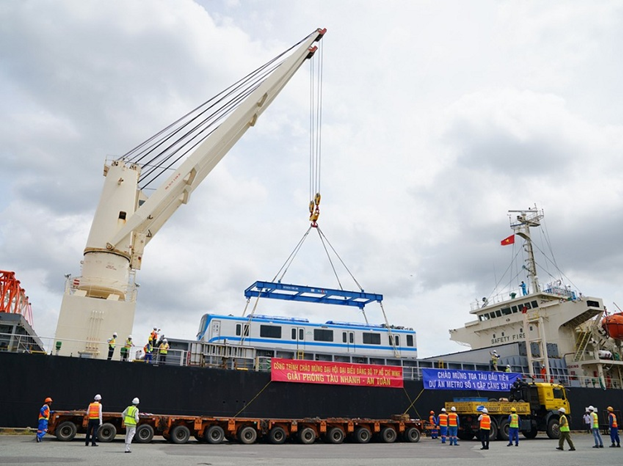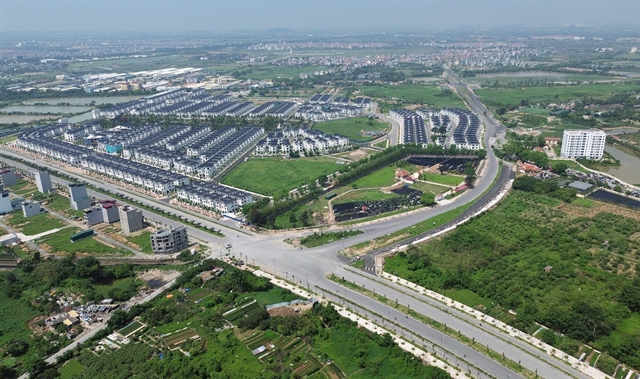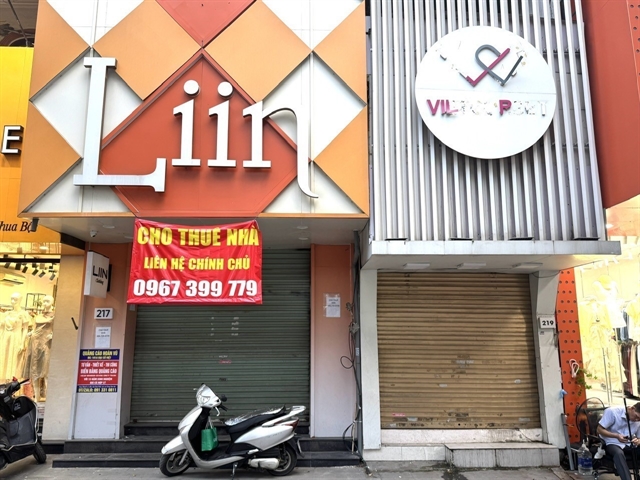 Economy
Economy


|
| A view of property projects developed in Hoài Đức Commune, Hà Nội. Hà Nội has proposed increases in land price framework, aiming to better reflect market values. — VNA/VNS Photo Quốc Khánh |
HÀ NỘI — Industry insiders have urged that careful consideration be given to Hà Nội’s proposal to raise land prices in the capital city, warning that the move could further weigh on an already overheated property market.
The Hà Nội Department of Agriculture and Environment has completed a draft land price framework to be applied from January 1, 2026, which proposes increases in most areas. Under the draft, prices in downtown areas are proposed to increase by around 2 per cent while those in suburban areas by up to 26 per cent.
The municipal department said that as the land price framework serves as a basis for land-related policies and investment attraction, the proposed increases aim to narrow the gap between official land prices and actual market prices and harmonise the benefits among the State, land users and investors.
Experts, however, warned that the proposal could add fuel to the fire amid skyrocketing housing prices in the capital city in recent years. Adjusting the land price framework is necessary to better reflect market values and boost budget revenues but the lack of control and of a clear roadmap for implementation could worsen the situation.
Nguyễn Văn Đính, President of the Việt Nam Association of Real Estate Brokers, said increasing the land price framework in an unreasonably inflated market would mean that the Government inadvertently validates distorted values and create a new unsustainable price floor.
“If market prices are being artificially inflated, the State’s new price framework will only reinforce that distortion,” he said.
The new land price framework would become a tool anchoring inflated prices, making it harder for the market to correct itself, Đính said.
He added that higher official land prices would push up costs for real estate developers, which would push up selling prices and make housing far more unaffordable to a majority of home seekers.
According to Trần Xuân Lượng, deputy director of the Việt Nam Association of Real Estate Brokers' Institute of Research and Evaluation, increasing land prices at this moment is not in line with the Government’s directive on controlling housing prices to cool down the market.
Land-related expenses typically account for around 30-50 per cent of total real estate development costs, he said, adding that when official land prices are increased, every component cost from compensation and site clearance to financial obligations will also increase.
A reasonable roadmap needed

|
| Retail shops for rent along Chùa Bộc Street, Hà Nội. Experts urge Hà Nội to develop an appropriate roadmap for adjusting land prices to avoid unexpected economic and social impacts. — VNA/VNS Photo Quốc Luỹ |
While upgrading the land price framework is necessary to bring it in line with market values, it is necessary to develop an appropriate roadmap for adjustment which is supported by solid data, Lượng said.
More importantly, the adjustment in land prices must be implemented in tandem with related policies on taxation, the development of land databases and the valuation process. “If land prices are raised in isolation without improving the taxation system and market transparency, the policy could further destabilise the market,” Lượng stressed.
He urged the Government to temporarily delay the approval of the new land price framework until the land database, evaluation and taxation policies are developed.
In a document sent to the Hà Nội People’s Committee, the Việt Nam Real Estate Association (VNREA) acknowledged that revising the land price framework is necessary to better reflect market values, but timing and implementation must be handled with caution.
The association warned that land price increases at this moment could push up housing prices, slow public investment projects, and undermine the capital city’s competitiveness.
“Land price adjustment is essential, but it must balance the interests of the Government, businesses and the public,” VNREA President Nguyễn Văn Khôi said.
The VNREA outlined key issues for Hà Nội to consider before approving the new land price framework, including ensuring fair land access for businesses, assessing impacts on competitiveness and GRDP growth, avoiding cost overruns in public infrastructure projects, supporting the Government’s goal of stabilising housing prices and ensuring social welfare.
As land is an important production input, increases in land prices could ripple through related sectors such as construction, materials, banking, production and business which could threaten macroeconomic stability and economic goals, the association said, adding that land valuation should aim to enhance land access for businesses.
VNREA particularly warned that land prices in suburban areas where affordable housing projects are expected to be developed are also rising sharply, which could undermine efforts to increase the supply of affordable housing.
The VNREA warned that higher land prices could raise investment costs, delay project implementation and weaken competitiveness which is not reasonable in the context that the Government is targeting double-digit growth from 2026 and Hà Nội is aiming for an average GRDP of 11 per cent per year during the 2026-30 period.
In addition, higher land prices could increase financial burdens on developers and undermine the attractiveness of housing projects which might worsen the shortage of housing supply and further push up housing prices, straining the Government’s efforts to cool off the real estate market and ensure social welfare.
The VNREA emphasised the importance of improving the regulatory framework for land management to ensure transparency and accurately reflect the true value of land use rights, urging that land valuation must be carefully studied to avoid unexpected economic and social impacts.
Lawyer Nghiêm Thị Hằng from the Hà Nội Bar Association said that Hà Nội needs to develop an appropriate roadmap for adjusting land prices to prevent shocks that could leave heavy impacts on daily life, production and business as well as the entire economy.
Under the draft proposal from the city’s Department of Agriculture and Environment, Hà Nội plans to adopt a new land price table from January 2026, with 17 zoning areas instead of the current district-based system.
The highest proposed residential land price of over VNĐ700 million per square metre, would apply to streets in former Hoàn Kiếm District, up about 2 per cent from the current rate.
Land prices in suburban areas such as An Khánh, Hoài Đức and Đan Phượng are proposed to increase by up to 26 per cent. — VNS




